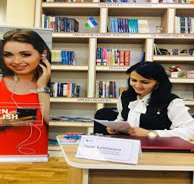The NETRUZ has started its teacher training course on Formative Assessment Practices. This training has been organised with the support of Hornby Trust and the British Council. There are ... guest speakers who will be presenting in this training. The NETRUZ is grateful to our guest speakers for their kind help and support.
Guest speaker Day 1: Dr. Bahia Diefenbach, USA
Dr. Bahia Diefenbach, an Instructional Design and Assessment expert, has extensive experience in teaching as well as in designing, developing, and implementing EFL/ESL training materials and curricula. She has strong leadership skills and a proven record to initiate, design, and implement innovative ideas while supporting and inspiring team members she works with. She has the ability to foster growth and interest, and to promote success. Dr. Bahia Diefenbach’s work experience in diverse cultural environments makes her adaptable to frequent changes. She has a positive attitude and effective communication skills. She is very approachable, easy to work with, and has already been proven to be a great asset to teachers and colleagues in Uzbekistan.
Guest speaker Day 3: Khanh-Duc Kuttig, Germany
Khanh-Duc has an MA in TESOL from Canterbury Christ Church University (UK) and has been teaching English since 1995. Currently in the Department of English as the University of Siegen, she teaches a range of language courses on the teaching degree. She is Events Coordinator for her local teaching association as well as IATEFL’s Teacher Training and Education SIG. She is also newsletter co-editor for the TESOL Teacher Education Interest Section and is TESOL/NGL 2021 Teacher of the Year.
Guest speaker Day 4: Charlotte Benham, USA
Charlotte Benham is from Massachusetts and completed her BA in History in 2007 and her CELTA in Montréal, Canada. She started her teaching career as a Fulbright English Teaching Assistant in Nepal in 2009. Since then, Charlotte has worked as a teacher and administrator for ESL programs in the United States, Nepal, Bangladesh, and the United Arab Emirates. Ms. Benham has extensive experience in working with students transitioning from high school to university. Her interests lie in developing students’ critical thinking skills and the relationship between reading comprehension and academic writing. Now, she is working as an EAP teacher at British Management University in Tashkent.
 Guest speaker Day 6: Prof. Lic. Andres Villalba, Argentina
Guest speaker Day 6: Prof. Lic. Andres Villalba, Argentina
Andrés Villalba is an EFL teacher with a BA in Applied Linguistics from Universidad Nacional del Litoral de Santa Fe, Argentina, and a specialization from Ohio University in USA. Andrés delivers conferences about education for universities, ministries of education and teachers’ associations in Argentina and abroad. This year he has received the Tesol International Association Award for International Participation.

Guest speaker Day 7: Kari Miller, Ecuador
Kari Miller has been a teacher and teacher educator since 1995. She has taught and trained teachers around Ecuador, working closely with various universities in Quito and Guayaquil to design and write professional development courses for secondary and higher education professors. In addition to giving courses to university professors in Quito, Guayaquil, and Ibarra, she has also participated in various writing projects, including co-authoring the Uncover for Ecuador series (Cambridge University Press), and The Academic Books 1, 2, 3, and 4. She co-authored the National EFL curriculum implemented by the Ministry of Education in 2016. Her work has been presented in several international conventions. Her latest research work was presented at TESOL 2021.
Guest speaker Day 7: Dr. Laura Loder Buechel, Switzerland
Laura Loder Buechel (
https://phzh.ch/personen/laura.loder) is a teacher trainer at Zurich University of Teacher Education and an editor of the Swiss journal of language education, Babylonia (
https://babylonia.online/ ). She did her undergraduate work at La Salle University (Philadelphia, USA), her graduate work at Northern Arizona University and her doctorate at the University of Fribourg, Switzerland.
Guest speaker Day 8: Dr. Lena Barrantes, Costa Rica
Dr. Lena Barrantes holds a Ph.D. from the University of Calgary in Canada. She started her career by completing an English Teaching Major. Then, she completed a Licentiate’s program in Applied Linguistics with an emphasis on English as a Foreign Language, a master's degree in Second Languages and Cultures and a master's degree in Educational Management with an Emphasis in Leadership. She has been an EFL instructor and teacher trainer for 20 years in Costa Rica, at Universidad Nacional, Sede Regional Brunca. She also worked for the Ministry of Public Education teaching young learners for 8 years. She has shared her research and practice contributions in national and international conferences, and published in journals in the area in Canada, Mexico, Spain, Argentina, Costa Rica, and Peru.



























